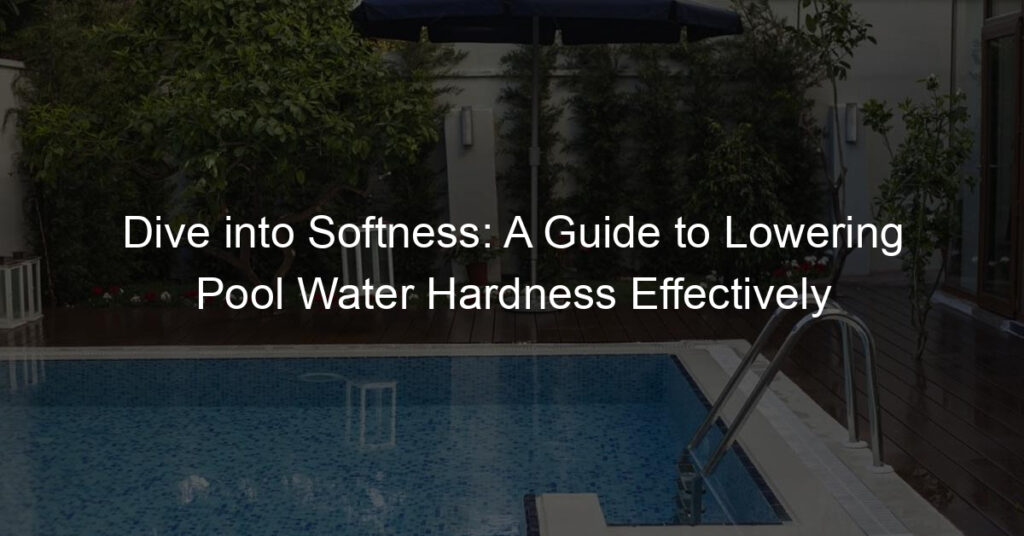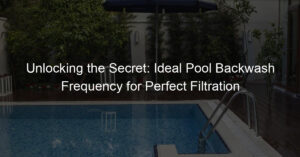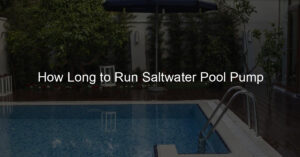Introduction to Pool Water Hardness
Have you ever wondered why sometimes your pool water feels different on your skin? Or why the sides of your pool feel rough or scale-like? The answer lies in the concept of pool water hardness. In this blog post, we will explore this concept, understand why maintaining the right pool water hardness levels is crucial, and learn how to manage it effectively.
- Understanding the concept of pool water hardness
- Why maintaining the right pool water hardness levels is crucial
Pool water hardness refers to the amount of dissolved calcium and magnesium in your pool water. These minerals are naturally present in water. When their levels are too high, we say the water is ‘hard’. On the other hand, when these levels are too low, the water is ‘soft’.
Imagine you’re holding a piece of chalk. That chalk is mostly made of calcium. When you dip it in water, some of it dissolves. This is similar to what happens in your pool. The dissolved calcium and magnesium make the water hard. But why should we care about this? Let’s find out.
Maintaining the right pool water hardness levels is crucial for several reasons. Firstly, if the water is too hard, it can lead to scale formation on your pool walls and equipment. This not only looks unattractive but can also damage your pool equipment over time.
Secondly, if the water is too soft, it can cause corrosion. The water will try to balance itself by pulling calcium from your pool walls and equipment, leading to damage. Therefore, maintaining the right balance is key to a healthy and long-lasting pool.
Now that we understand the concept of pool water hardness and its importance, in the next sections, we will delve into the chemistry of pool water and learn how to manage hard pool water effectively. Stay tuned!
Understanding Pool Water Chemistry
When it comes to maintaining a swimming pool, understanding the chemistry of pool water is crucial. Let’s delve into why pool water chemistry is so important.
Importance of Pool Water Chemistry
Pool water chemistry plays a pivotal role in keeping your pool healthy and safe. It impacts not only the pool equipment but also the swimmers. Let’s explore these aspects in more detail.
- Role of pool water chemistry in maintaining a healthy pool
- Impact of imbalanced pool water chemistry on pool equipment and swimmers
Proper pool water chemistry ensures that the water is clean and clear. It helps in preventing the growth of harmful bacteria and algae, which can turn the pool water green and make it unsafe for swimming. A well-balanced pool water chemistry also helps in maintaining the clarity and sparkle of the water, making the pool inviting.
Imbalanced pool water chemistry can have adverse effects. It can cause damage to the pool equipment such as the pump and the filter system, leading to costly repairs. For swimmers, imbalanced pool water can cause skin and eye irritation, and in severe cases, it can lead to respiratory problems. Therefore, maintaining the right balance of pool water chemistry is essential for the longevity of your pool and the health of the swimmers.
In conclusion, understanding and maintaining the right pool water chemistry is not just about keeping the water clean and clear, but it’s also about ensuring the safety and health of the swimmers and prolonging the lifespan of your pool equipment.
Key Elements of Pool Water Chemistry
Understanding the chemistry of your pool water is like having a secret key. It helps you unlock the best ways to keep your pool clean, safe, and enjoyable. There are three main elements you need to know about: pH levels, alkalinity, and calcium hardness. Let’s dive in and learn more about each one.
- pH Levels
The pH level of your pool water is a measure of how acidic or basic it is. Imagine a scale from 0 to 14. A pH of 7 is right in the middle and is considered neutral. Anything below 7 is acidic, and anything above 7 is basic. For your pool, the ideal pH level is slightly basic, between 7.2 and 7.6. This range is safe for swimmers and helps your pool equipment work properly.
- Alkalinity
Alkalinity is like a support system for the pH level. It helps keep the pH stable, even when things like rain, leaves, or pool chemicals are added to the water. The recommended alkalinity level for a pool is between 80 and 120 parts per million (ppm). If the alkalinity is too low, the pH can swing back and forth too easily. If it’s too high, it can make it hard to adjust the pH when needed.
- Calcium Hardness
Calcium hardness tells you how hard or soft your pool water is. This is all about the amount of calcium in the water. If the water is too hard, it can lead to scale build-up on your pool walls and equipment. If it’s too soft, it can cause the water to become corrosive, which can damage your pool. The ideal range for calcium hardness in a pool is 200-400 ppm.
By keeping an eye on these three key elements, you can ensure your pool stays in great shape. Remember, every pool is unique, so it’s important to test your pool water regularly and adjust as needed. Happy swimming!
Dealing with Hard Pool Water
Understanding how to deal with hard pool water is crucial for the maintenance of your swimming pool. This section will guide you on how to identify hard pool water and the steps you can take to manage it.
Identifying Hard Pool Water
Before you can deal with hard pool water, you need to know how to identify it. Here are some signs and testing methods to help you determine if your pool water is hard.
- Signs of Hard Pool Water
- Testing for Swimming Pool Water Hardness
Hard pool water often leaves visible signs. You may notice a white or greyish scale forming on the pool surfaces, including the tiles, ladders, and pool equipment. This scale is caused by high levels of calcium and magnesium in the water. Additionally, the water may appear cloudy, and swimmers might complain about dry skin or hair after swimming.
While visible signs can give you a hint, the most accurate way to determine water hardness is through testing. You can use a pool water testing kit, which you can purchase from a pool supply store. These kits usually contain strips that change color based on the mineral content in the water. By comparing the color on the strip with the color chart provided in the kit, you can determine the hardness of your pool water.
Remember, identifying hard pool water is the first step in dealing with it. Once you’ve identified it, you can take the necessary steps to soften your pool water and maintain a healthy and enjoyable swimming environment.
Effects of Hard Pool Water
Hard pool water can have several impacts, both on your pool equipment and surfaces, as well as on the health and comfort of swimmers. Let’s delve into these effects in more detail.
- Impact on Pool Equipment and Surfaces
- Effects on Swimmers’ Health and Comfort
Hard water can lead to the buildup of calcium deposits on your pool equipment and surfaces. This is often referred to as scaling. Over time, these deposits can cause significant damage. For instance, scaling can clog your pool’s filter and plumbing system, reducing their efficiency and lifespan. It can also make the pool surfaces rough and unsightly, which can lead to higher maintenance costs.
Hard water can also impact the health and comfort of those who use the pool. It can cause skin to feel dry and itchy, and hair to become dull and brittle. Some swimmers may even experience eye irritation. Moreover, hard water can alter the effectiveness of pool chemicals, making the water less safe for swimmers. It’s important to regularly check and adjust the hardness of your pool water to ensure a comfortable and safe swimming experience.
In conclusion, dealing with hard pool water is crucial not only for the longevity of your pool equipment and surfaces but also for the health and comfort of swimmers. Regular testing and adjustment of water hardness can help mitigate these effects.
Lowering Pool Water Hardness
Having a swimming pool is a great way to cool off during hot summer days. However, maintaining the right water hardness level can be a challenge. Hard water can cause problems like cloudy water, scale formation, and even damage to your pool equipment. Fortunately, there are several methods to lower pool water hardness.
Pool Water Treatment Methods
Here are three effective methods to reduce the hardness of your pool water:
- Using chemicals to reduce calcium hardness in pools
- Water dilution method
- Using a water softener
One common method to lower water hardness is by using chemicals. You can use a calcium reducer, which is a type of chemical that helps reduce the level of calcium in the water. This method is effective, but it’s important to use the right amount of chemical to avoid causing other problems in your pool.
The water dilution method involves adding fresh water to your pool to dilute the hard water. This method is simple and cost-effective, but it may require a lot of water, especially if your pool is large.
Another method to reduce water hardness is by using a water softener. This device works by replacing the calcium and magnesium ions in the water with sodium ions, which makes the water softer. While this method can be effective, it’s important to note that it may increase the level of sodium in your pool water.
Each of these methods has its pros and cons, so it’s important to choose the one that best suits your needs and the specific conditions of your pool. Remember, maintaining the right water hardness level is crucial for the health of your pool and for ensuring a pleasant swimming experience.
Preventive Measures
Preventing hard pool water is easier than treating it. Here are two key steps you can take to keep your pool water balanced and healthy.
- Regular Pool Water Testing
- Proper Pool Water Maintenance
Regular pool water testing is a crucial step in maintaining the right water hardness. It helps you keep track of the water’s chemical balance. You can use a simple pool water testing kit, which you can find at any pool supply store. This kit will measure the levels of different chemicals in your pool water, including calcium hardness. By testing your pool water at least once a week, you can catch any changes early and adjust the water chemistry as needed.
Proper pool water maintenance goes hand in hand with regular testing. This includes keeping your pool clean, ensuring your pool’s filtration system is working correctly, and adjusting the water chemistry as needed. For instance, if your pool water testing shows high calcium hardness, you might need to add a chemical to lower it. On the other hand, if the calcium hardness is too low, you might need to add a calcium increaser. Regular maintenance can prevent problems before they start, saving you time and money in the long run.
In conclusion, regular pool water testing and proper pool water maintenance are key preventive measures for hard pool water. By taking these steps, you can enjoy a clean, healthy pool all summer long.
Softening Hard Pool Water: Case Studies
Let’s take a look at a couple of real-life examples that illustrate the process of softening hard pool water. These case studies will provide practical insights into how to effectively deal with this common pool maintenance issue.
- Case Study 1: Successful Reduction of Pool Water Hardness
In this first case, a pool owner in Phoenix, Arizona, was struggling with hard water due to the high mineral content in the local water supply. The hardness level was measured at 800 parts per million (ppm), significantly above the ideal range of 200-400 ppm.
The pool owner used a combination of methods to reduce the hardness level. First, they partially drained and refilled the pool with fresh water, which lowered the hardness level to about 600 ppm. Then, they used a chemical water softener specifically designed for pools, which brought the hardness level down to the ideal range.
After these steps, the pool water was noticeably softer, and the owner reported less scaling on the pool surfaces and equipment. This case shows that with the right approach, it’s possible to significantly reduce pool water hardness.
- Case Study 2: Dealing with Persistent Hard Pool Water
In the second case, a pool owner in Las Vegas, Nevada, was dealing with persistent hard pool water, despite regular use of a water softener. The hardness level was consistently above 500 ppm.
Upon further investigation, it was discovered that the pool’s water softener was not functioning properly. The owner had it repaired, and also started using a chelating agent, which binds with the minerals in the water and prevents them from causing hardness.
After these steps, the hardness level dropped to the ideal range and has remained stable. This case underscores the importance of regular equipment maintenance and the potential benefits of using a chelating agent in addition to a water softener.
In conclusion, these case studies demonstrate that while hard pool water can be a challenging issue, it can be effectively managed with the right strategies and tools.
Conclusion: Balancing Pool Water Hardness
As we wrap up our discussion on pool water hardness, it’s clear that achieving a balance is crucial for the health of your pool and those who enjoy it. Let’s summarize the key points and the importance of regular maintenance.
- Key takeaways for maintaining balanced pool water hardness
- Pool water hardness refers to the amount of dissolved calcium and magnesium in your pool water.
- Too hard water can lead to scale formation and cloudy water, while too soft water can cause corrosion and damage to your pool equipment.
- Regular testing is essential to monitor the hardness level of your pool water.
- Methods to manage water hardness include using a water softener, adding a hardness increaser, or partially draining and refilling your pool with fresh water.
- Importance of regular pool water maintenance
- Regular maintenance helps prevent pool problems before they become serious and expensive to fix.
- It ensures the water is safe for swimmers by keeping the chemical levels balanced.
- Maintenance tasks like cleaning and filtering help keep your pool looking its best.
- Regular upkeep extends the lifespan of your pool and its equipment.
Understanding and managing your pool’s water hardness is a fundamental part of pool maintenance. Here are the key takeaways:
Regular pool maintenance goes beyond just managing water hardness. It’s about ensuring your pool is safe, clean, and enjoyable. Here’s why it’s important:
In conclusion, balancing pool water hardness is a key aspect of pool maintenance. By understanding the basics of pool water chemistry and taking steps to manage water hardness, you can keep your pool in top shape and ready for enjoyment at any time.














